Looking for the best restaurant website builder to help your business stand out online? You’re not alone – popular website builder platforms promise a quick, affordable way to launch your restaurant’s digital presence, with stylish templates and easy setup. But before you dive in, it’s crucial to know: not all website builders are created equal. While these tools can seem like the perfect shortcut, they often come with hidden costs, limitations, and long-term headaches that could hold your restaurant back.
As a restaurant owner, your website is often the first impression potential customers have of your business. It’s not just about having any website – it’s about having the right website that truly represents your brand, engages visitors, and drives revenue.
In this in-depth guide, we’ll reveal what most reviews don’t tell you about the best restaurant website builders. You’ll learn why popular options may be a risky choice for your restaurant, and which alternatives can help you build a website that actually supports your business goals and long-term success.
Table of contents:
What are Restaurant Website Builders?
Restaurant website builders are all-in-one platforms that allow restaurant owners to create, customize, and manage their websites without coding knowledge. These tools use drag-and-drop editors, pre-built templates, and restaurant-specific features (like online ordering, reservations, and menu displays) to simplify the process of building a restaurant website. However, they also come with limitations – since they’re proprietary platforms, you don’t own your site fully, and switching providers can be difficult.
The main appeal of the top restaurant website builders is their convenience. They offer an accessible solution for busy restaurateurs who want to get online fast, often bundling essential features like menu displays, reservation forms, and online ordering.
Here are some of the most popular restaurant website builders and what they offer:
While these proprietary platforms are popular for their ease of use and convenience, it’s important to be aware of their limitations. Despite their quick setup and attractive features, restaurant website builders often come with significant long-term drawbacks-especially regarding ownership, performance, customization, and scalability. Before choosing a website builder, consider whether it truly fits your restaurant’s needs for growth and control.
PRO TIP
Balance the convenience of website builder quick setup with significant trade-offs of ownership, template design, limited customization and scalability.
The primary reason that small business owners use website builders is to (a) rapidly get a website up and running, and (b) not spend a lot of money. However, they often overlook the most critical factor: a website must effectively achieve its intended purpose – not just exist online.
That bring us to the fundamental question: what should be the primary purpose of the restaurant website?
PRO TIP
A restaurant website primary purpose is to act as the online hub for new customers acquisition, engaging them with compelling content, and converting their interest into reservations, orders, and repeat visits.
This overarching objective can be broken down into several key components:
Acquisition: Getting New Customers
SEO Optimization: A well-optimized website helps the restaurant appear in local search results, attracting more potential customers.
Mobile Optimization: With the increasing use of smartphones, ensuring the website is mobile-friendly is crucial for reaching potential customers.
Fast Loading Times: A quick-loading website improves user experience and can positively impact search engine rankings.
Engagement: Enhancing Customer Experience
High-Quality Visuals: Appetizing food photography and attractive images of the restaurant can entice visitors to dine in or order.
Showcase the Restaurant’s Unique Identity: The website should effectively communicate the restaurant’s brand, atmosphere, and culinary style through visuals and content.
Provide Essential Information: Visitors should easily find crucial details such as location, hours of operation, contact information, and directions.
Display the Menu: An up-to-date, easy-to-read menu is critical for attracting customers and helping them decide to visit or order.
Conversion: Facilitate Customer Actions
Enable Online Reservations: A user-friendly reservation system can significantly increase bookings and help manage restaurant capacity.
Offer Easy Online Ordering: Implementing a seamless online ordering system can boost sales and cater to customers who prefer takeout or delivery.
Encourage Signup: Features like newsletter sign-ups, social media links, and contact forms can help build a loyal customer base.
Promote Special Offers: The website can be used to highlight promotions, events, or new menu items, encouraging repeat visits.
Showcase Reviews and Testimonials: Positive customer feedback can build trust and influence potential diners’ decisions.
By focusing on these objectives, a restaurant website can effectively serve as a powerful tool for attracting customers, increasing revenue, and building a strong online presence in the competitive food service industry. The website should be seen as an extension of the restaurant itself, providing a taste of the dining experience and making it easy for customers to engage with the business.
When Does It Make Sense to Use a Website Builder?
While custom websites offer the most flexibility and long-term value, there are situations where using a website builder is a practical choice for restaurants:
- Pre-launch or Grand Opening: If you’re racing against the clock to open your doors, a website builder can help you quickly create a simple online presence to announce your grand opening, share basic information, and start building excitement.
- “Coming Soon” Pages: Need to generate buzz before your official launch? Website builders make it easy to set up a branded “coming soon” or teaser page to collect email signups, share updates, and start building your customer list.
- Temporary or Pop-Up Locations: For short-term restaurant concepts or pop-up events, a website builder offers a fast and cost-effective way to get online without a long-term commitment.
- Very Small Budgets: If your budget is extremely limited, a website builder allows you to establish an online footprint at minimal upfront cost, giving you time to plan and invest in a more robust website later.
In these scenarios, website builders serve as a convenient solution to “stand up” a temporary site and get your essential information online. As your restaurant grows and your needs become more complex, you can then focus on developing a professional, fully customized website that supports your long-term goals and brand identity.
Why You Should Not Use A Website Builder Long-term?
There are 3 absolutely unquestionable factors you should consider:
1. Your restaurant is unique; your website won’t be.
Your restaurant’s ambiance, story and menu are what set you apart from competitors – your website should reflect that same individuality. But with website builders, you’re limited to a handful of templates that thousands of other restaurants are using.
Squarespace
Squarespace has just 110 templates, yet millions of sites rely on them, meaning your online presence could look nearly identical to tens of thousands of others. Simple math shows us that 36,363 websites share the same template on an average.
Would you want your restaurant website to be looking the same as ~36,363 other websites around you?
Here is an example of the template page to choose from:
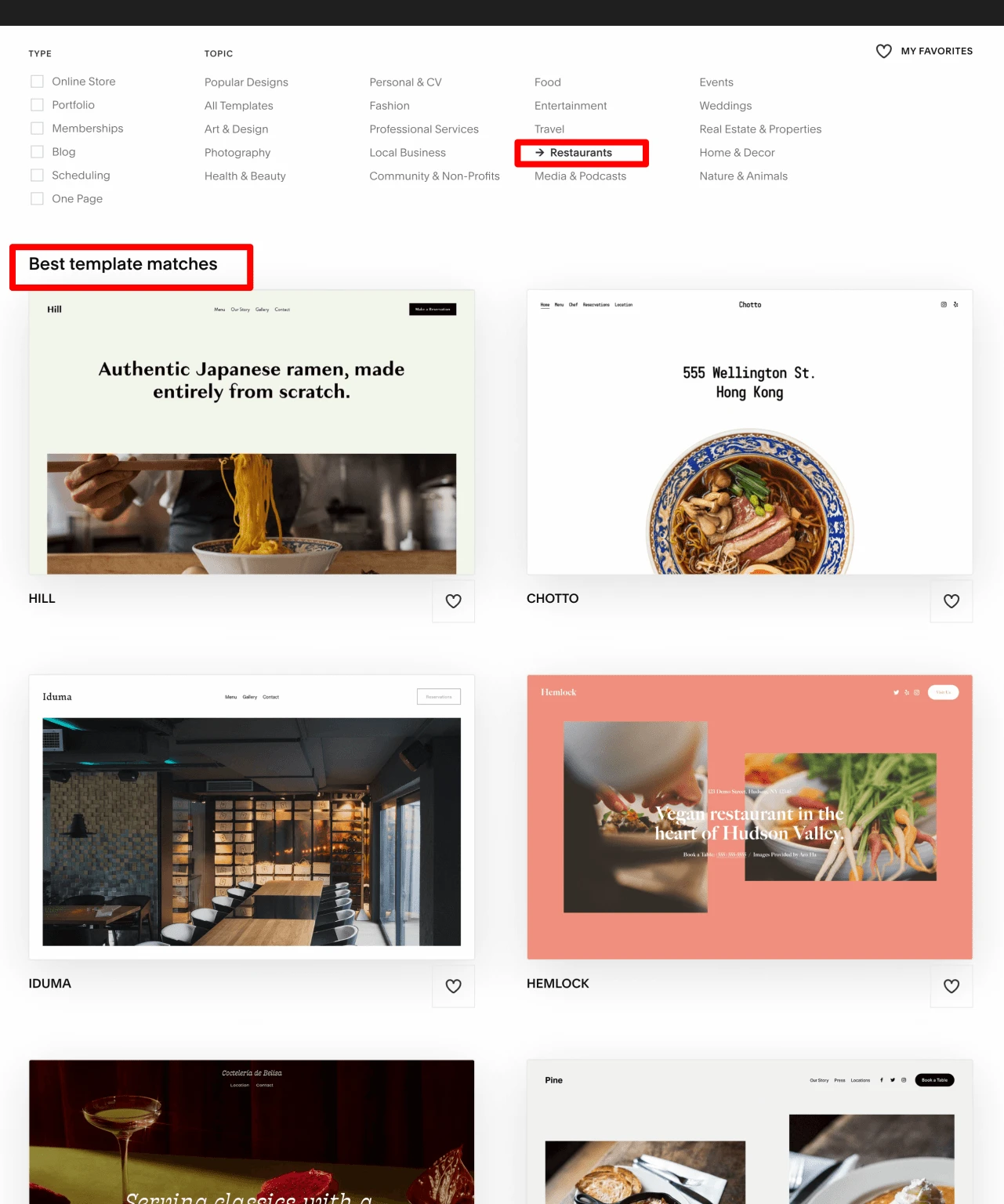
Owner.com
Here are portfolio samples from the company’s website, showcasing restaurant websites that share a similar design and layout.
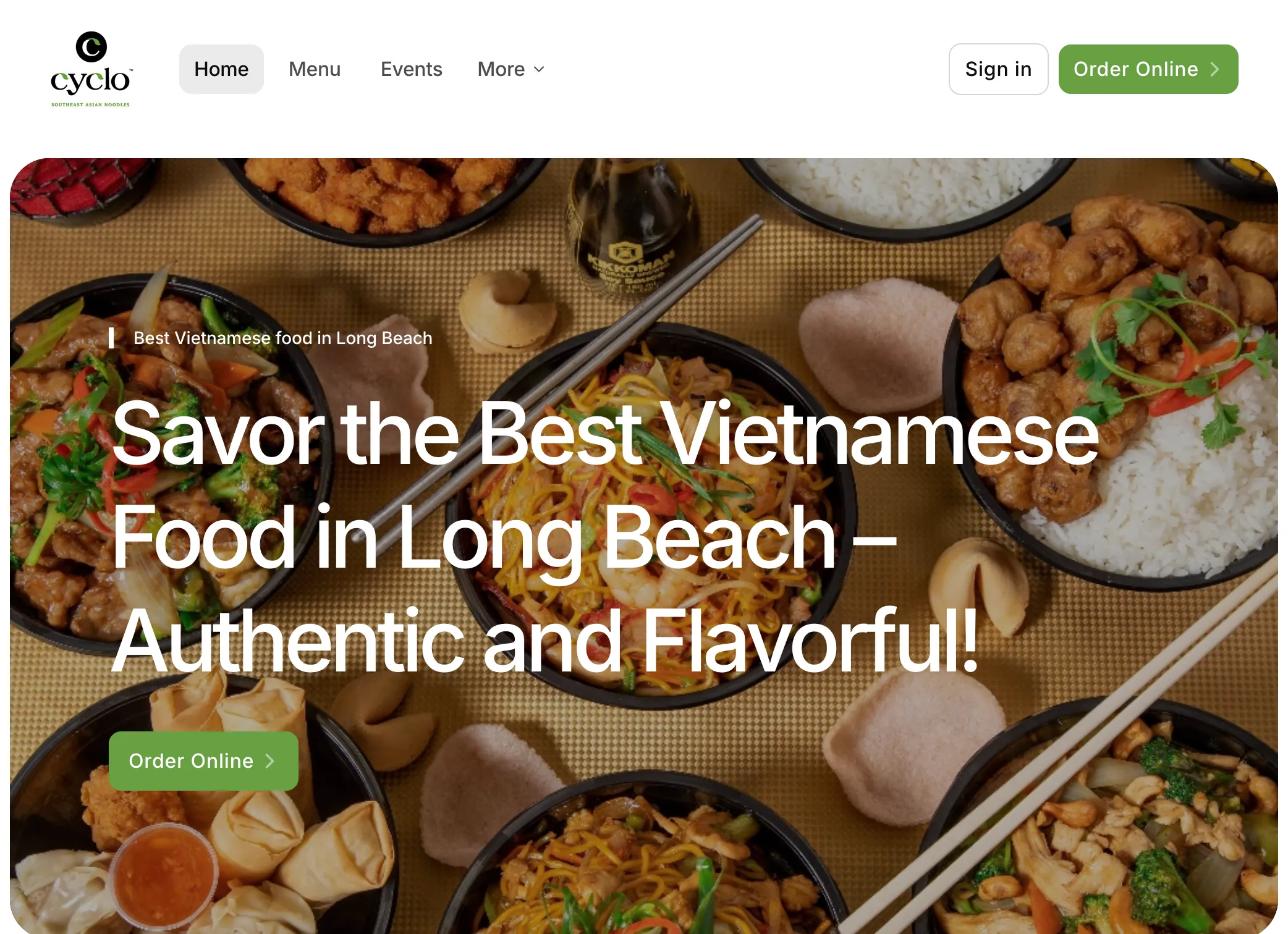
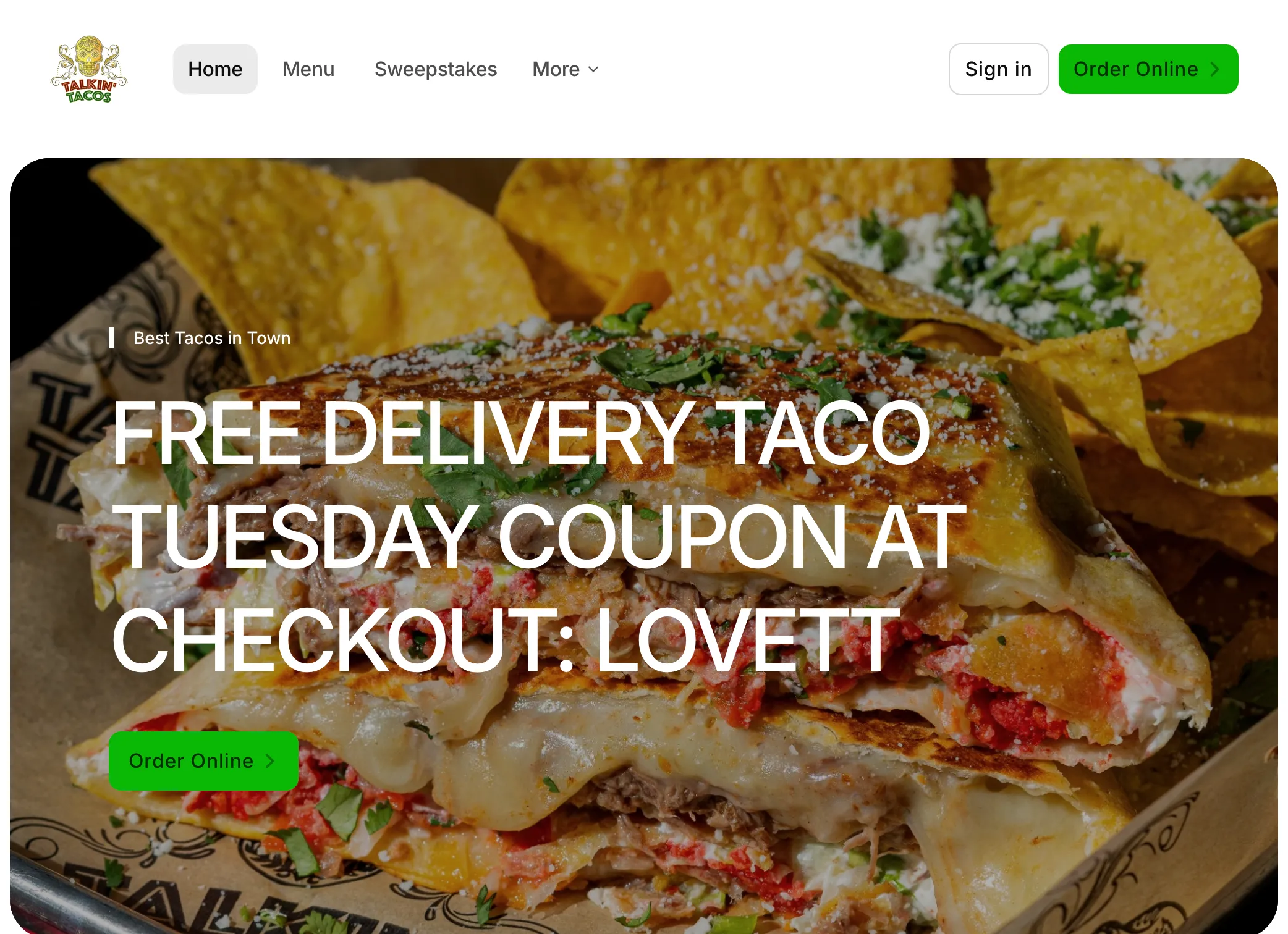
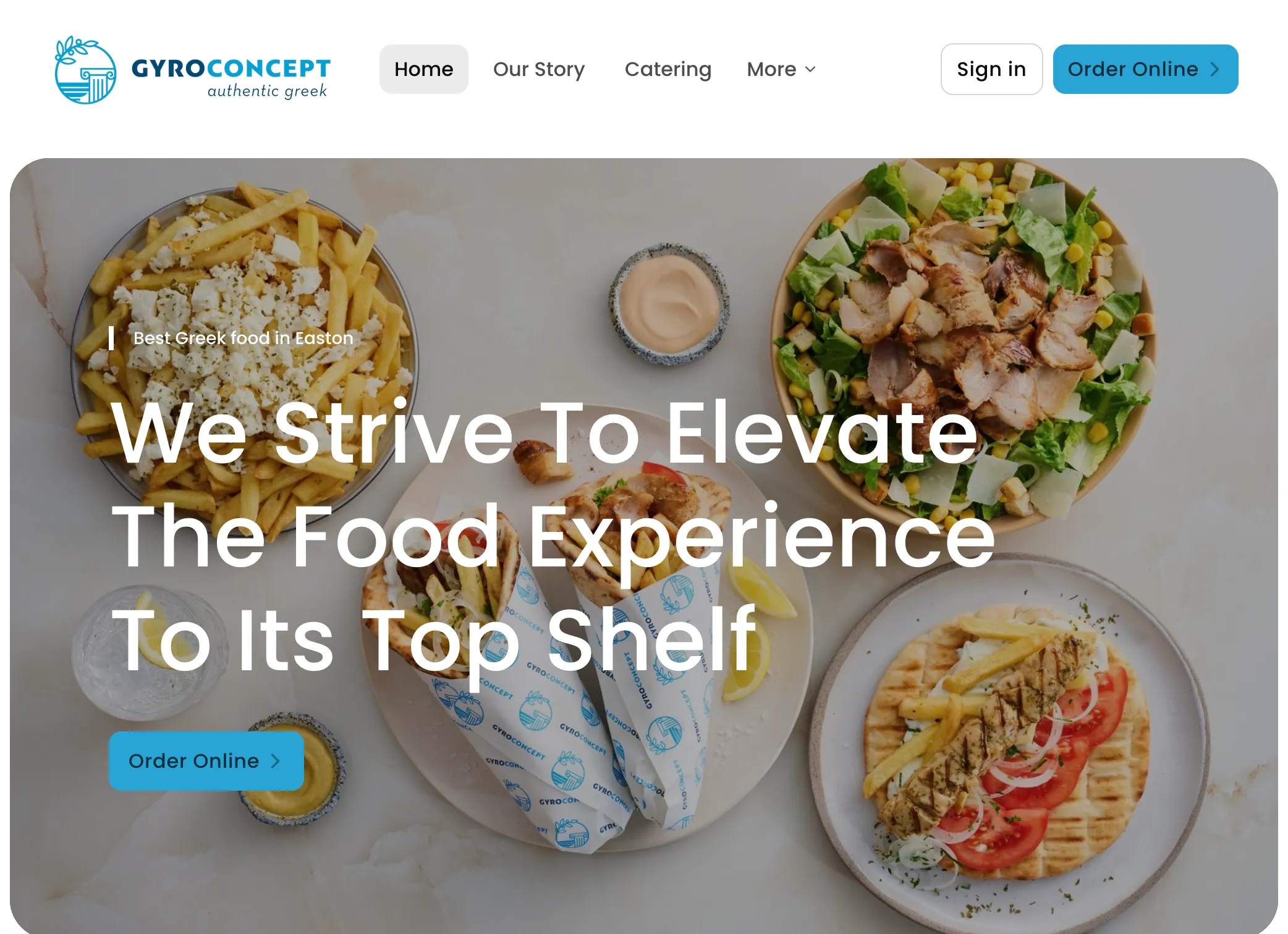
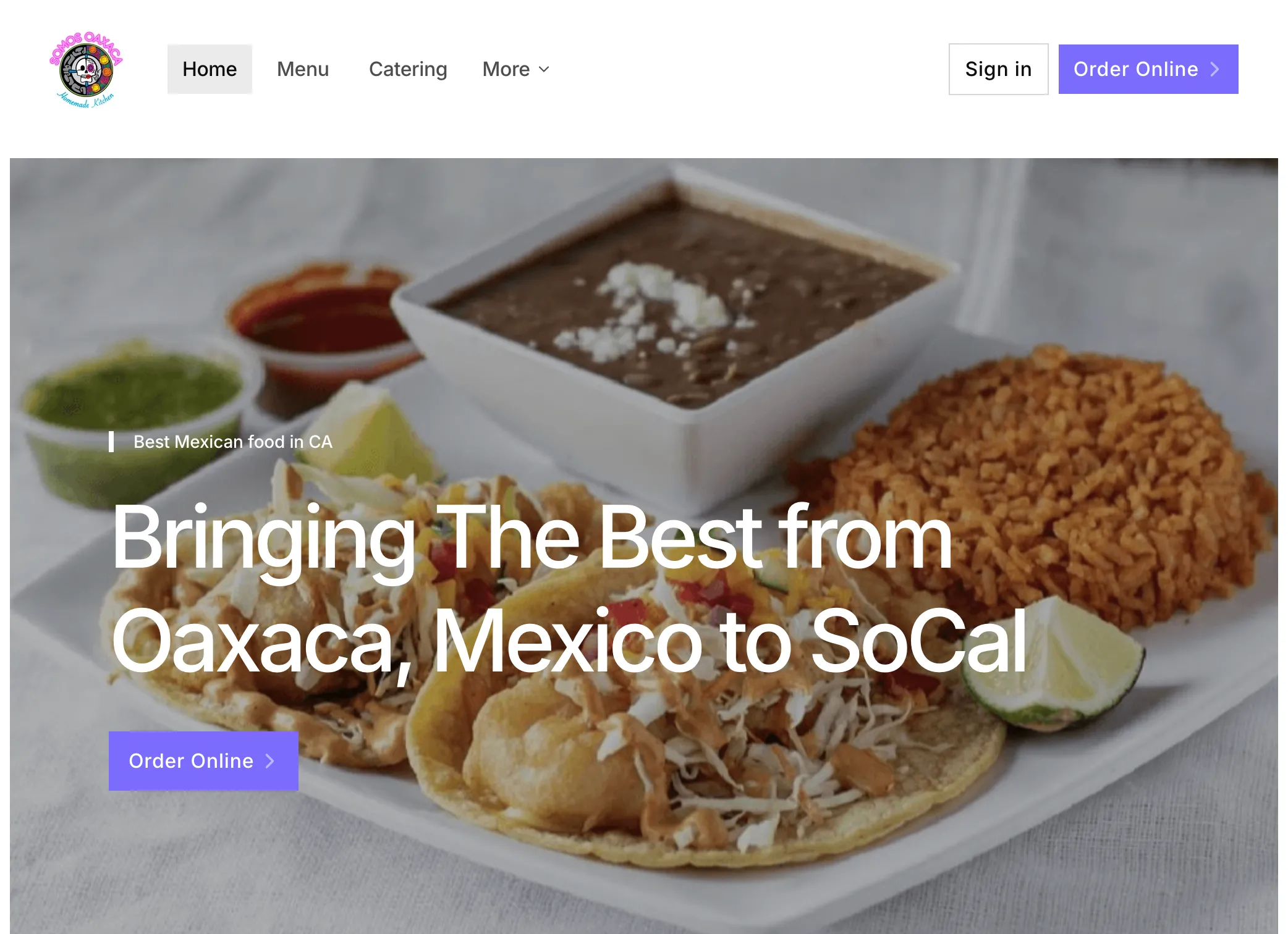
Owner.com websites follow a templated approach and intentionally limits your ability to customize the look and feel of your site. Every restaurant using Owner.com gets a nearly identical layout and structure, because the platform prioritizes conversion optimization over visual uniqueness.
This means that, despite the specialized features and restaurant-centric tools Owner.com offers, your website will still look and feel very similar to others using the same platform. If your goal is to express your restaurant’s unique story, atmosphere, or brand personality online, these limitations can hold you back. Ultimately, even with restaurant-specific builders, you risk blending in rather than standing out.
You pride yourself on the quality of your food and the beauty of your restaurant. It’s what sets you apart from your competitors and makes you unique. But if you use a site built by a website builder, you will be using the same template as thousands of other restaurants.
What does that say about your restaurant? It certainly doesn’t scream amazing unique experience. If anything it says we don’t care about our brand and we may not care about your experience. If you’re an independent restaurant using a website builder, you’re no better than a chain restaurant.
If you’ve invested time and passion into creating a one-of-a-kind restaurant, don’t let your website be an afterthought. Make sure your digital presence is as memorable and distinctive as your dining experience. Let us help you create a digital presence as unique and memorable as your dining experience. Book a free strategy call today and discover how a custom website can set your restaurant apart.
2. You do NOT own the website – Accept it!
When you use a website builder, you’re essentially renting your online presence rather than truly owning it. The platform controls your website’s design, hosting, and even your content. If you ever decide to leave or outgrow the builder, you can’t simply take your website with you-you’ll often have to start from scratch on a new platform.
This lack of ownership has real consequences. Your investment in building and maintaining your site is tied to the builder’s ecosystem, meaning you’re subject to their pricing changes, feature limitations, and even the risk of the company discontinuing services or shutting down. You have little control over backups, data portability, or how your site evolves as your restaurant grows.
Squarespace terms of services state that – Any content you upload to their builder remains “yours.” However, they have “permission” to use it in ways necessary to provide, improve, promote, and protect THEIR services.”
If your content is theirs to use, is it truly yours?
Worse, still, however, is the fact that you could be stuck using your website builder for the rest of the time you are in business.
Websites built using Wix and Squarespace are notoriously difficult (and sometimes impossible) to migrate. In fact, you won’t actually own the website. You will just be renting it from Wix or Squarespace.
These companies do this on purpose so that you have to keep paying the monthly fee. What is the point in paying for a website that you don’t own and can’t change?
Hint: there isn’t one!
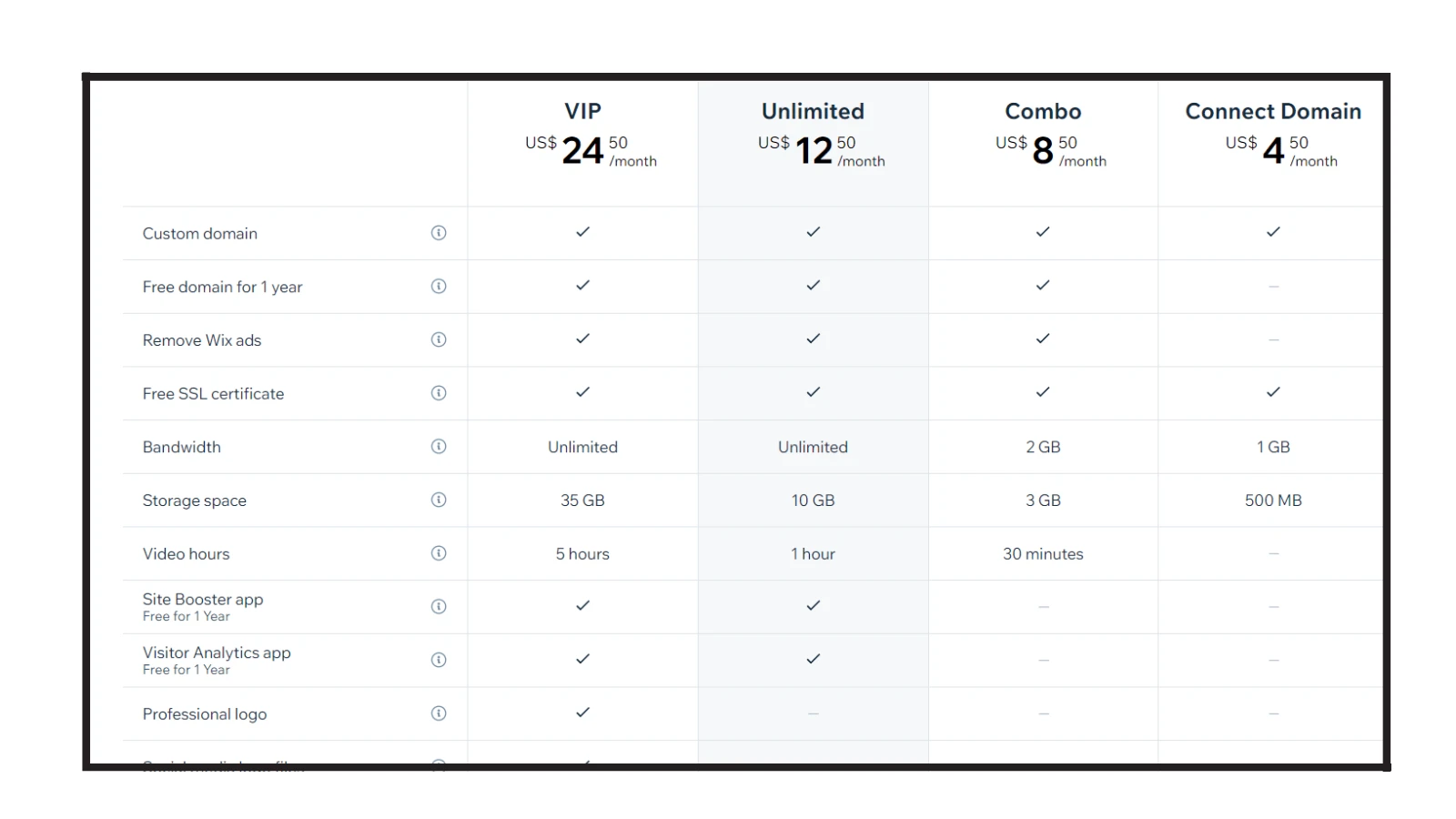
- Your site may lose some of its customizations.
- For some builders, your domain and branding will reset to the website builder’s free, cheaper looking aesthetic.
- For others like Squarespace, your site will be deleted after 30 days. This means subscriptions are endless, for life!
Don’t let a third-party platform hold the keys to your online success. Choose a solution that gives you full ownership and control over your website, so you can grow your restaurant on your own terms.
3. They are really bad for SEO
This is perhaps the biggest issue with restaurant website creators. They are terrible when it comes to ranking in Google—even though they sell themselves as being SEO-friendly.
Restaurant Website Performance Test Study
Since majority of online visitors (70–80%) to restaurant websites use mobile devices, we conducted a performance analysis using Google’s PageSpeed Insights tool to evaluate mobile user experience of restaurant websites build on various website builder platforms.
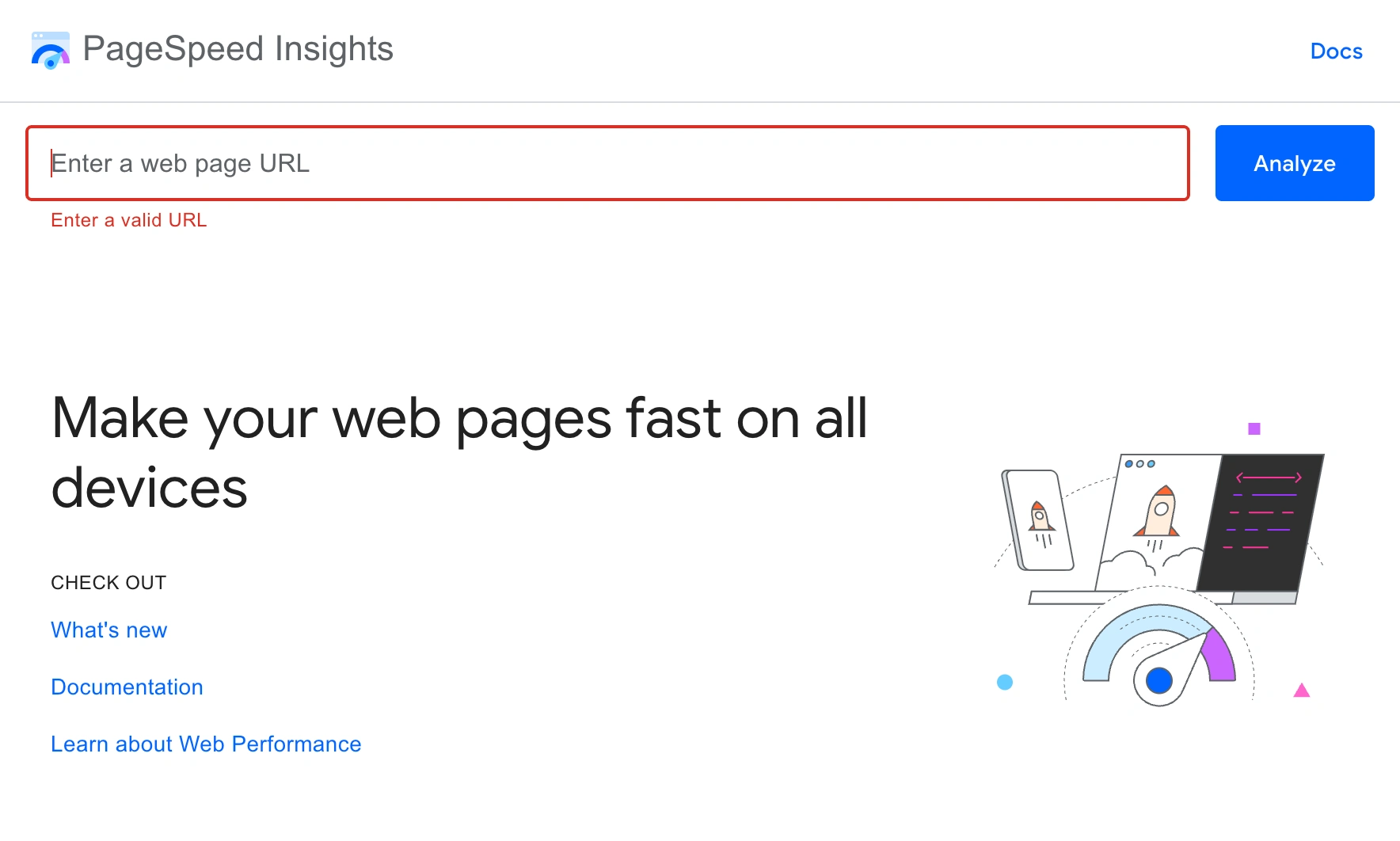
Here is the analysis summary:
| Website Builder Platform | Mobile Performance (Average Score) | Google Core Web Vitals Assessment |
|---|---|---|
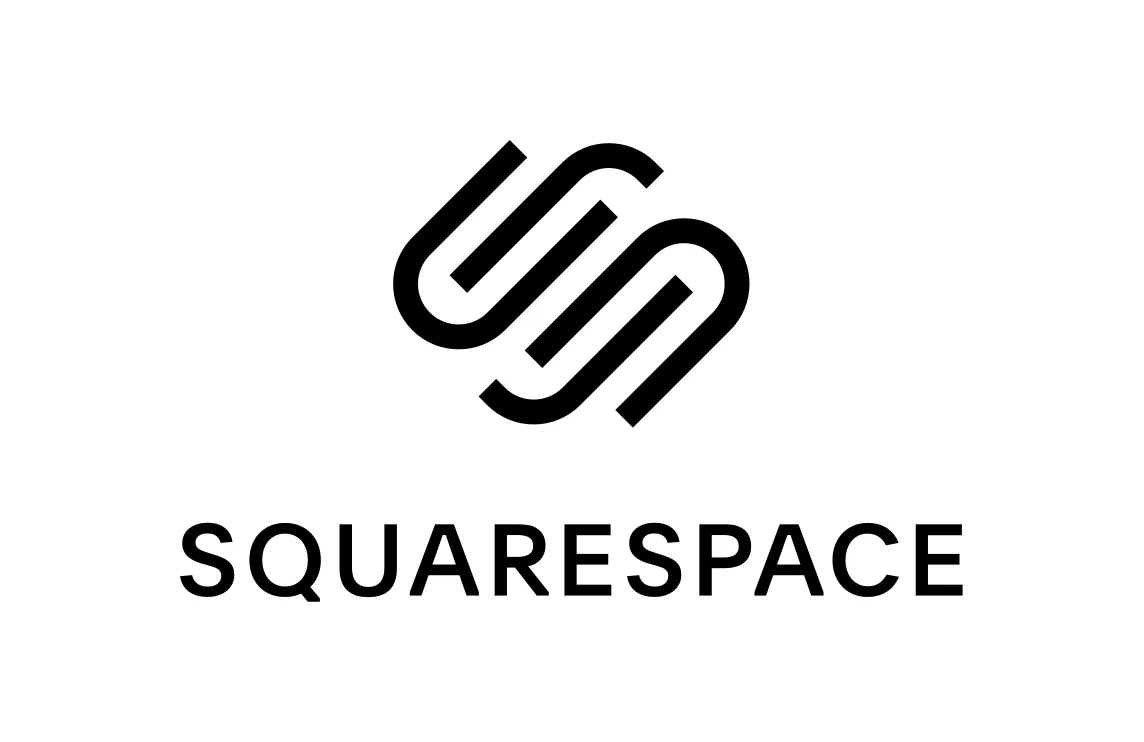 | 55 / 100 | Failed |
 | 53 / 100 | Failed |
 | 73 / 100 | Failed |
 | 55 / 100 | Failed |
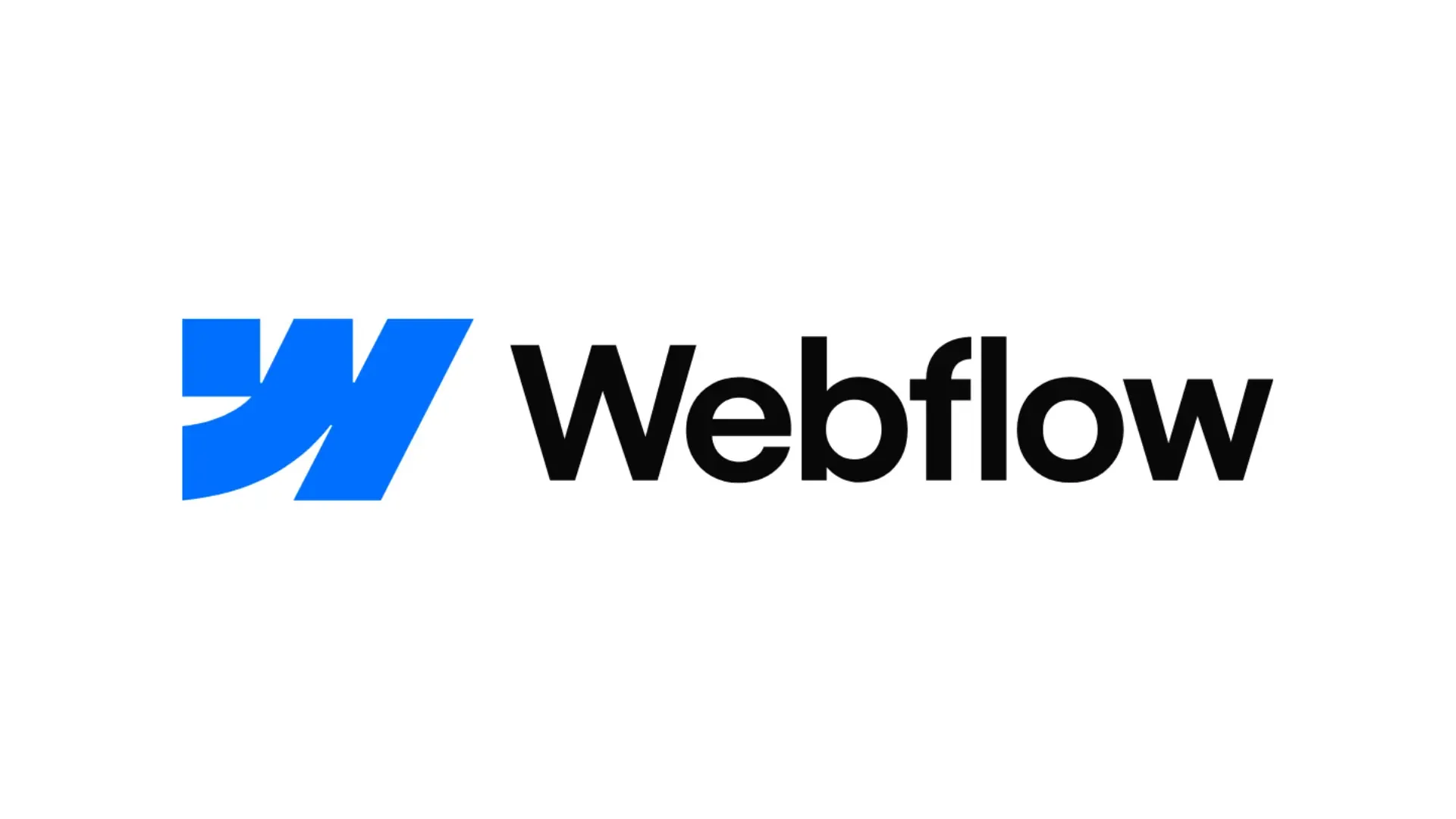 | 36 /100 | Failed |
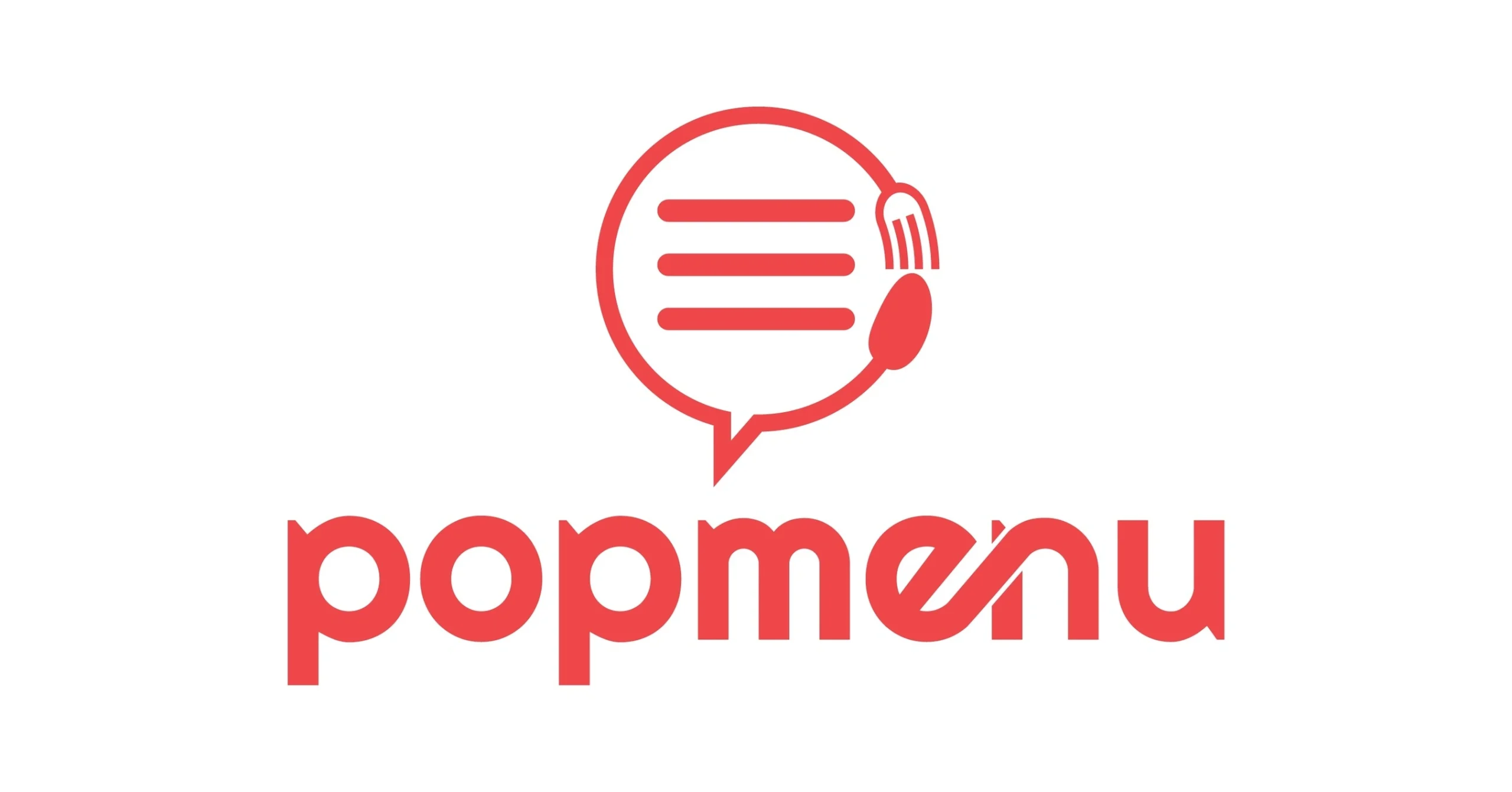 | 72 /100 | Passed |
 | 60 /100 | Failed |
| 38 /100 | Failed | |
| 23 /100 | Failed | |
 | 95+ /100 | Passed |
Key Takeaway:
As shown in the comparison above, website builders often lag behind WordPress in key web vitals. Investing in a high-performing website not only improves your search rankings but also ensures your customers have a seamless experience-leading to more reservations and online orders.
The data above also highlights a significant advantage for WordPress websites: they deliver higher scores in mobile performance and SEO, which are essential for ranking well on Google and providing a smooth experience for your guests. Choosing the right platform can make a measurable difference in your restaurant’s online success.
There are a couple of reasons why a website built using a website builder isn’t likely to rank well on Google. For one, these builders tend to spit out a jumble of code because of the way they let users customize their sites. The code created by any page builder will always be exponentially more bloated.
While these may allow users to create the site they want, the masses of code tend to lead to the poor on-page structure which can slow the website down significantly. There’s nothing you can do to improve the code of your website to make it faster, either as most builders have a closed source code.
A Google study shows that if a page takes more than 3 seconds to load, 53% of consumers will abandon it.
Website builders tend to focus more on the aesthetic of the website rather than the backend technicalities that make your website a well-oiled SEO machine that actually attracts traffic.
What you don’t want is a beautiful website that looks fantastic but receives little to no traffic due to its SEO limitations.
These results highlight why investing in a WordPress site vs using cheap website builders can give your restaurant a measurable edge online. Ready to see how your current site stacks up? Request a free website audit here »
4. Restricted Customization – your site may not do everything you want
Website builders by their very nature restrict customization.
Do you want to be able to take online orders through your website? How about integrating OpenTable so that customers can reserve a table?
If you use a website builder, it is doubtful that your website will be able to have this functionality. And if it does have it, it probably won’t work well.
That’s because websites built using website builders are meant to be basic. They aren’t meant to be used by forward-thinking restaurants who want to get the most out of their website. And because you are just one customer in a million, you aren’t going to get the functionality enabled that you need.
5. You can’t grow or change your website
Build your restaurant’s website with a website builder, and you’re stuck with it. It may not have a Content Management System (CMS), which means you won’t be able to add or edit the pages you create. It also means you won’t be able to add new content such as blog posts to grow your traffic and attract new customers.
6. You don’t get the support you need
What happens if your website stops working or part of it breaks? The matter could be resolved in less than an hour if you used a web design agency. But if you use a website builder, you could be the one having to work out how to fix the problem.
What Can Restaurant Owners Do Instead?
(a) Build on WordPress CMS (Open-source)
WordPress is the world’s most popular CMS software, and it powers around 43% of all websites on the internet. You cannot go wrong building your restaurant website on WordPress for the following reasons:
- It’s free. The WordPress platform is open-source and is entirely free to use.
- It’s highly flexible and customizable. Many themes and plugin options are available to expand the website’s functionality.
- It’s a scalable platform to meet the needs of the business as it grows There’s no need to migrate to a different platform once the website takes off.
- It’s relatively easy to use to create beautiful, fully functional websites using only the graphical user interface.
(b) Hire Professional Website Designer
Use a trusted restaurant web design agency to create your restaurant website. You will get a much, much better experience and a much better end product. When you use a proper agency, you will:
- Actually own your website outright
- Get a great looking unique website built to rank in Google
- Support for at least a year and probably a lot longer
- Have a website that works on all smartphones
- Get expert advice and support along the way
(c) Host on Dedicated Secure Hosting Server
Use dedicated hosting server to host your restaurant website. Avoid shared hosting for cheaper cost where your website coexists with that of other websites who share the same server. Here are the reasons:
- Server resources not shared: with dedicated hosting, you get the full resources of the server. You don’t need to worry about other shared websites clogging up the server’s CPU and RAM. With a dedicated server, you can be sure that other websites do not affect your website.
- Unique IP address: Each server has it’s own unique IP address. With shared hosting, that means that you are also sharing an IP address with multiple other websites. If one of your neighbors is a spam site or an adult site, this could mean having your websites’ rank pushed down. With dedicated hosting, you have a dedicated server, which means your own unique IP address. This is especially important if you are a online ordering site that requires SSL for credit card processing.
- Enhanced performance and security: dedicated servers provide more stability and reliability than shared hosting.With a dedicated server, you can also be sure that you aren’t sharing space with a malicious website or a potential spammer. Dedicated hosting allows enhanced security, particularly important for restaurants handling online ordering transactions.
- Scalability & Flexibility: A dedicated server allows to scale and customize server environment that fits their needs. They can choose the platform and software they really need, allowing more control over how their dedicated server is configured.
Conclusion: Choosing The Right Platform
Choosing the right platform for your restaurant’s website is a critical decision that impacts your brand, customer experience, and long-term growth. While the best website builders offer convenience and quick setup, they often come with significant limitations in ownership, customization, SEO, and scalability.
| Feature | Website Builders | Custom/WordPress Solution |
|---|---|---|
| Ownership | No (rented) | Yes (fully owned) |
| Customization | Limited | Unlimited |
| SEO Performance | Often Poor | High (fully optimized) |
| Scalability | Limited | High |
| Support | Generic/DIY | Dedicated/Expert |
| Cost (Long-term) | Can be high | Higher upfront, lower over time |
| Migration | Difficult | Easy |
Our in-depth comparison and real-world data show that custom or WordPress websites consistently deliver better performance, higher search rankings, and greater flexibility to support your restaurant’s evolving needs. Investing in a professional, high-performing website not only sets your restaurant apart but also drives more reservations, online orders, and loyal customers.
Ready to elevate your restaurant’s online presence? Let us help you build a website that truly works for your business.
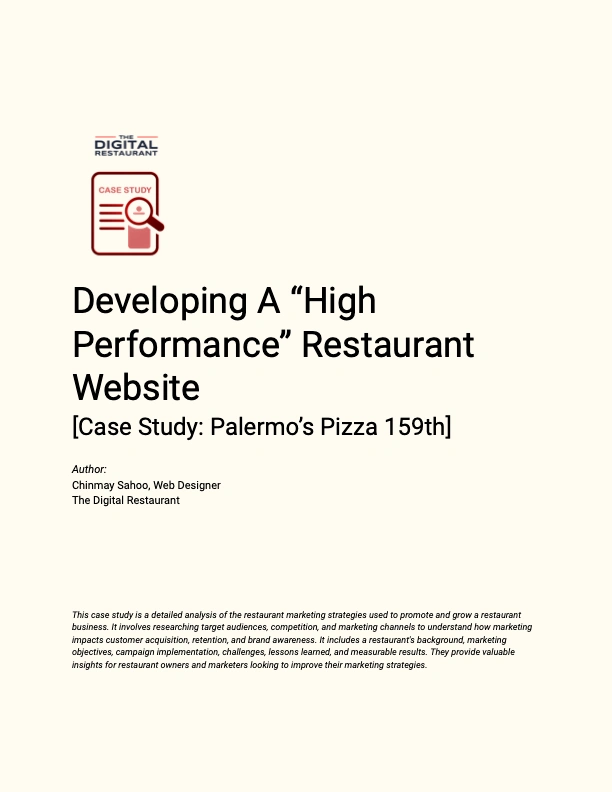
See a Real Example: High-Performance Restaurant Website
Curious how a custom-built website can transform a restaurant’s online presence and results? We’ve documented a real-world project where our team delivered a high-performance restaurant website-boosting traffic, engagement, and online orders.
Turn Restaurant Marketing Ideas
Into Predictable Growth
Successful restaurant brands don’t grow by stacking tactics.
They grow by running a connected growth system that turns visibility into orders – and first-time guests into repeat customers.
01
Diagnose visibility gaps
Identify where Google Maps, SEO, and AI search visibility are leaking demand today.
02
Fix conversion bottlenecks
Optimize website, menu, and direct ordering so web traffic actually turns into orders.
03
Scale repeat revenue
Use guest data (Email, SMS) to increase frequency, lifetime value, and predictable growth.
Built for serious operators – not one-off campaigns.
FAQs
What is the best restaurant website builder in 2025?
The best restaurant website builder depends on your needs, but top-rated options include Wix for its flexibility and restaurant-specific features, Squarespace for stylish design, and platforms like BentoBox for built-in online ordering and reservations. For full customization and long-term growth, many restaurants prefer a custom WordPress site.
Why should I consider a custom website over a website builder for my restaurant?
Custom websites offer complete ownership, unlimited customization, and better SEO performance, helping your restaurant stand out and grow online. Website builders are fast and affordable but often limit your brand’s uniqueness and scalability.
How important is SEO for restaurant websites, and do website builders support it?
SEO is crucial for attracting new customers through Google and other search engines. While most website builders include basic SEO tools, custom websites typically offer more advanced SEO optimization options, giving you a competitive edge in local search results.
Can I switch from a website builder to a custom website later?
You can, but migrating from a website builder to a custom site often means rebuilding your website from scratch, as most builders do not allow you to export your design and content easily. Planning for scalability from the start can save time and money long-term.
How do I choose the right website builder for my restaurant?
Consider your budget, design preferences, required features (like online ordering or reservations), and long-term goals. Compare top options and, if possible, test them with free trials before making a decision.
How can I make my restaurant website stand out from competitors?
Use high-quality photos, showcase your unique story, display customer reviews, and ensure your site is easy to navigate and optimized for mobile. Custom websites offer the most flexibility for creating a truly unique online presence.
Can I get help deciding what’s best for my restaurant?
Absolutely! Book a free strategy call with our team to get personalized advice and see how a high-performance website can help your restaurant attract more customers and grow.
Schedule appointment
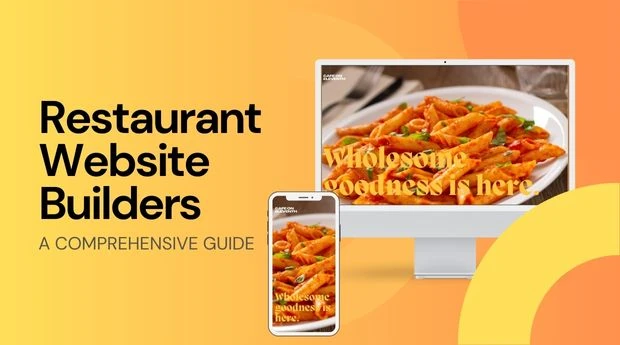
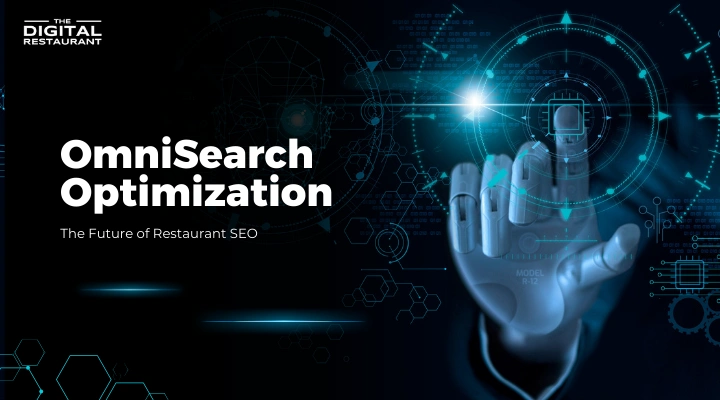
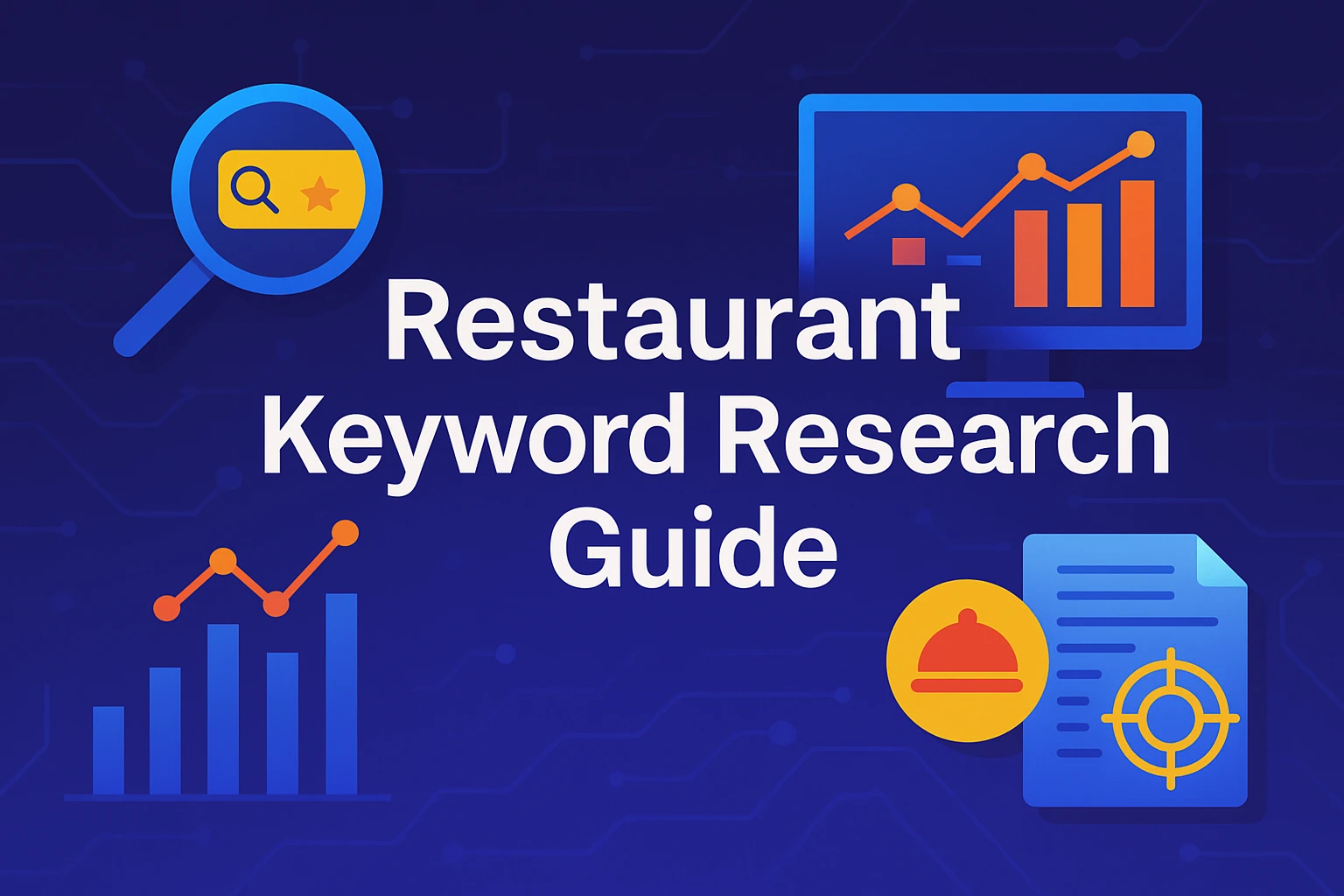
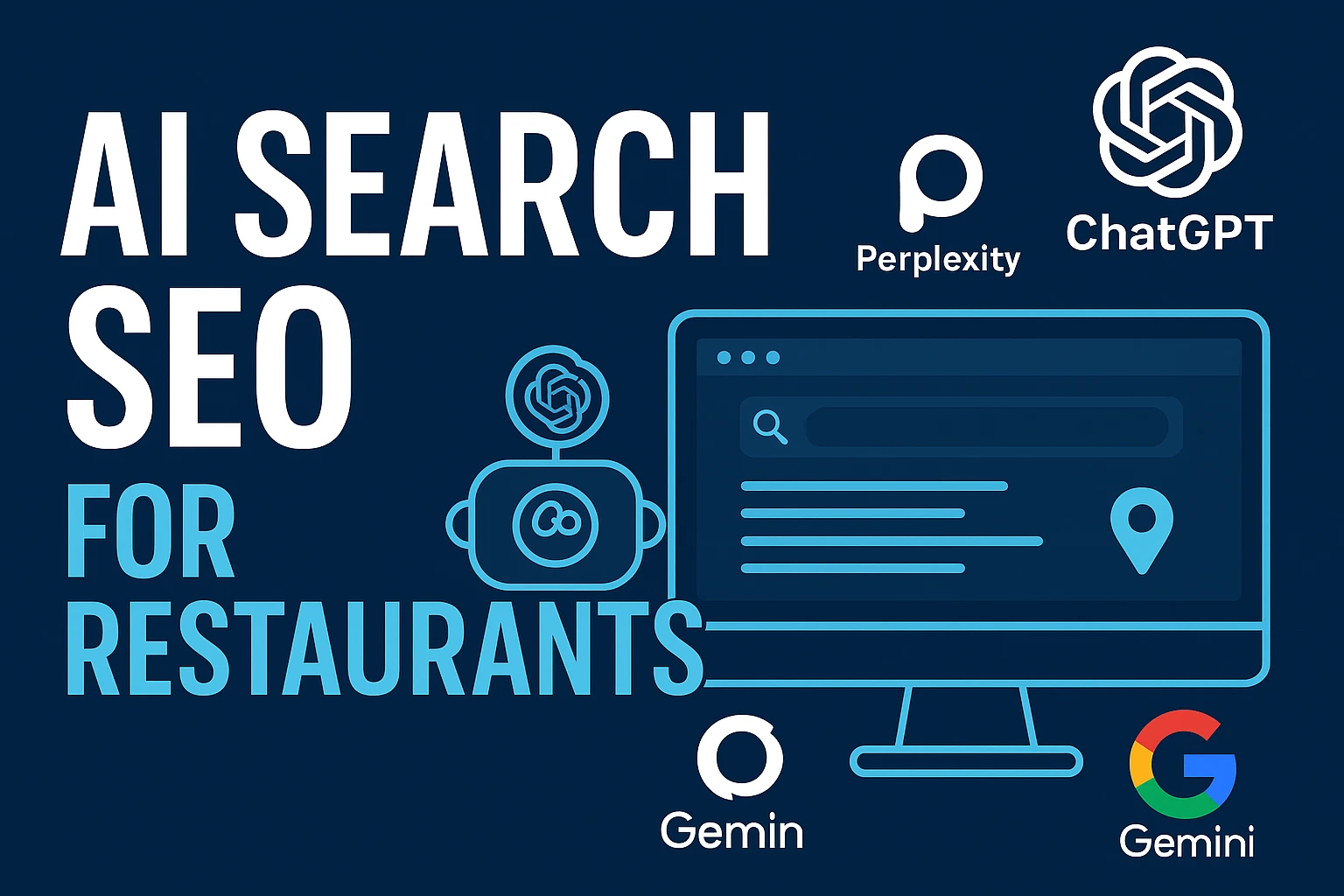
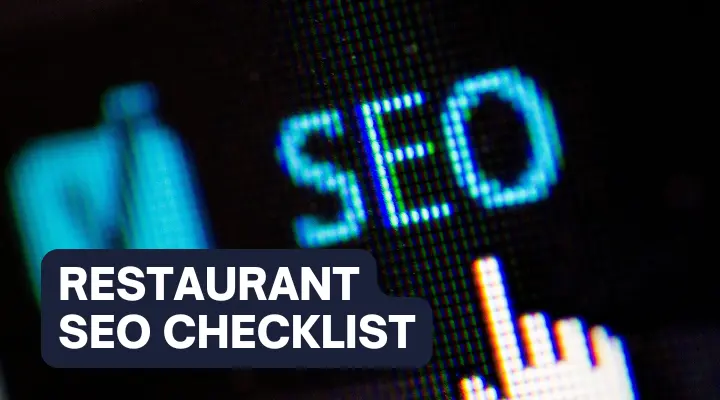
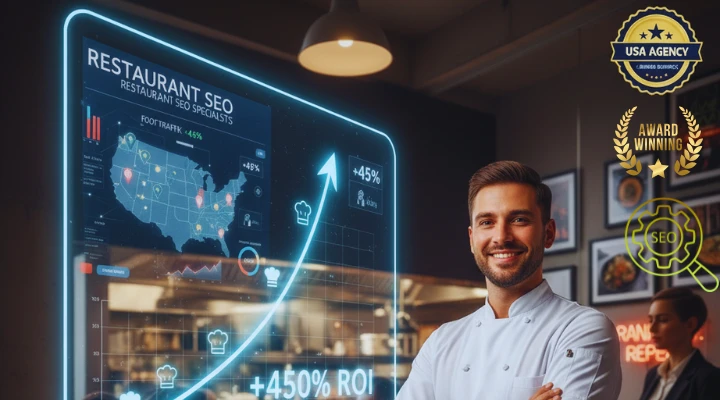
Leave a Reply